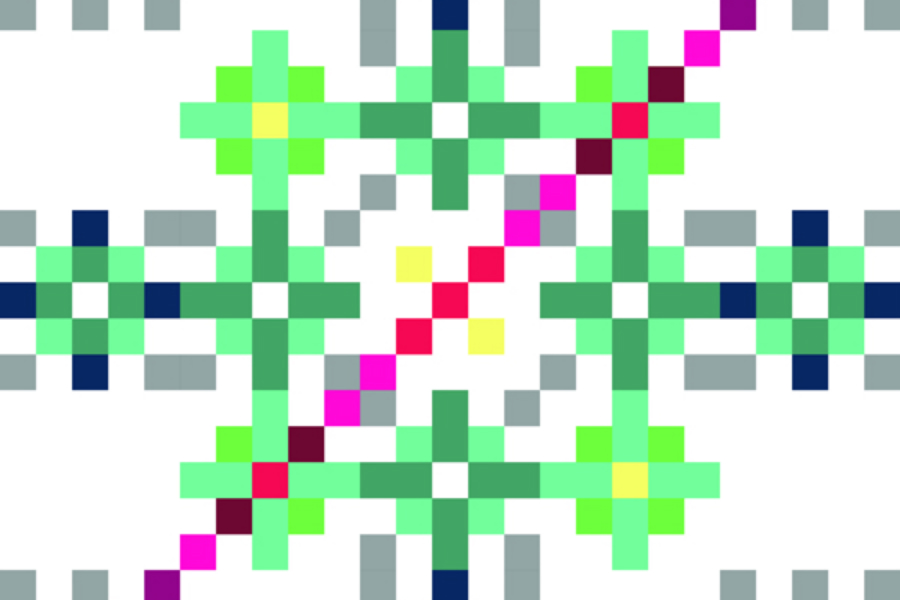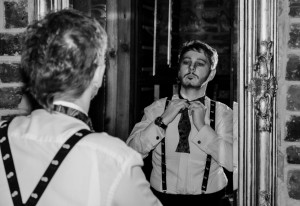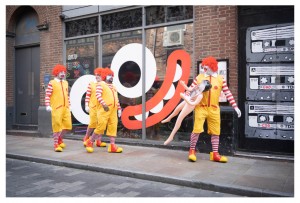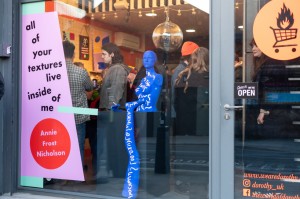Guided By Voices: Mercy’s Biennial Podcast

C James Fagan talks to writer and academic Vanessa Bartlett who has been commissioned to produce Mercy’s Biennial podcasts…
This is it. There’s no denying it, the Biennial is here, announcing itself across the city, which has become a medium for numerous international artistic voices, each channelling a different aspect; and unless you’re blessed with a unique sensitivity, sometimes you can miss the softer voices that will call this city home for the next three months.
If only you had a voice that could help cut through the oceans of praise, bafflement and noisy video installations. One such voice belongs to Vanessa Bartlett, one time resident turned Unexpected Guest who, in conjunction with Mercy will produce a weekly podcast; acting as a kind of medium, through interviews, investigations of the art and artists. At 2PM every Friday, Vanessa will be divining information regarding all stuff Biennial directly into your ear. They also form part of Mercy’s otherworldly Electronic Voice Phenomena strand, an on-going investigation into the paranormal effects that technology have on the human voice.
I caught up with Vanessa to hear all about it…
C James Fagan: After listening to the first podcast, I was struck by the fact that, hopefully, lots of people will be guided by your voice. How do you feel about that?
Vanessa Bartlett: Guided by my voice? Well I really want these podcasts to work as a standalone thing. So it’s not like you definitely have to come to the Biennial to listen to the podcasts for it to make sense. I very much want this to be something you can listen to in the car or on your computer, or on your way to the Biennial. It’s funny, the two podcasts I’ve done so far I’ve been very aware that it has been my opinion and ideas. I quite enjoy that way of working and I’ve started to question myself ‘Why is it I just really like telling people what I think in this manner?’
CJF: In a way you’re an imaginary friend accompanying people around the Biennial.
VB: That’s really nice, yeah. I said in the introduction to the first podcast ‘think of us as an auditory hallucination’ so in a way yeah, what’s that film about the imaginary friend? Harvey? I quite like the idea of being an imaginary friend. I hope I’m not telling people what to think, it’s more of a reflection, holding up a mirror to Biennial. My particular take on the Biennial. There will be other podcasts which feature particular guests.
CJF: The general theme of the Biennial is hospitality and with these podcasts you’re being very open, and having a range of guest artists, writers etc. What will come from these meetings of the spirits?
VB: We’re having Scanner on, he’s our first guest, on September the 28th. He’s making a mix, he’s also going to be dropping in some ‘parasites’ – a regular feature with contributions from writers. He’s also reflecting the EVP theme which is very much at the core of what Mercy are doing at the Biennial. It’s something I’m really interested in as well, that thematic thread is definitely there, the idea is to bring in other voices.
CJF: Because you’re inviting people, to become involved, to become parasites. I can’t help but make a connection with earworms here. Are you intending to worm your way into people’s minds?
VB: That’s really funny, I’m getting earworms … certain interviews or certain pieces of music get stuck in my head as I’m editing these things. It would be nice if people got ideas and threads in their own heads that will change their perspectives on the way they see the Biennial. Being a bit of a parasite in people’s brains, that’s nice isn’t it? Worming your way in without telling people what to think but sowing the seeds, the hints of an idea.
CJF: Following on from that it feels like, with the EVP theme, it’s almost a form of possession.
VB: In a way. It’s funny that idea of interpretation; interpreting art. There was an article in Sevenstreets about the over-interpretation of one of the exhibitions at The Bluecoat. People don’t like to be told exactly what to think when they go to a gallery. Maybe I think it’s more subliminal, I mean it’s quite subjective and creative. Again, guiding in a subtle way.
CJF: Is it the intent of the podcast to produce Janet Cardiff-esque audio walks?
VB: Not as such. The podcasts are standalone and you don’t necessarily have to go to the Biennial, to listen and appreciate it. The Janet Cardiff audio walks are very much about locality and place, and negotiating a particular landscape.
CJF: Talking of landscapes, will the podcasts take note of the current standing of Liverpool’s cultural landscape?
VB: One of the things I think about Liverpool … the local art scene hasn’t been so good at historically – it’s improving slowly – is shouting about itself beyond itself. Beyond the local networks people evolve. I think it’s really important that there’s a number of big galleries and Biennial that are very good at being outward facing. Looking outside of Liverpool and I think that’s really important. Artists based in Liverpool can do that as well. Connecting with what’s happening outside of Liverpool, it’s healthier then just looking inside of Liverpool.
CJF: This isn’t your first Biennial. As you create the podcasts are the spectres of previous Biennials hanging over you?
VB: When the Biennial [began] I was sixteen and I remember going into the old Bluecoat; I said in the first podcast about having this international arts festival in Liverpool is really exciting and probably one of the reasons I got into art. So that history and heritage, and the role of the Biennial has played for me in the understanding of art is really crucial in how I might interpret this Biennial. The changing role and the relationship of the Biennial to the city is incredibly interesting. I chatted to the artist Dane Mitchell for the second week’s podcast and I was saying that the Liverpool Biennial was special and unique and much more engaged with the city then most other Biennial’s. I think the Liverpool Biennial is special in that way and I’m a case in point for its engagement with its local community because I came to it very young and have been part of every Biennial.
CJF: On hearing that, it’s hard not to see the history of the Biennial as part the history of you.
VB: History of me?
CJF: As you say, seeing your first Biennial at such a malleable age and being involved in each one since…
VB: I don’t think it should go as far as a history of me, but that’s what people like to listen to ; individual stories and perspectives about the Biennial.
CJF: You also have this unique role of being both citizen and tourist.
VB: That’s really nice, actually, to put it that way, both citizen and tourist. That’s the thing about the Biennial, it’s not necessarily the work at the Tate and the big exhibitions. What you remember most about the Biennial is walking around in the rain looking to find a piece of work in a park.
CJF: I know you as, among other things, a writer, so in vocalising your words do you adopt a different ‘voice’.
VB: Definitely. I’ve not done much talking stuff, I’ve done public speaking but I’ve never been in the situation where I’ve had to record my voice and listen back to it and it does take a little while to come to terms with hearing yourself. It’s very different, but I think that the thing about it being a voice is that I can record conversations with another voice as they are happening which makes it more immediate and much nicer material to work with than writing.
Writing is the civilizing process … but actually if you’re sitting in a room with an artist, with a microphone interviewing them, then you can be more playful and chat around different areas. Still you have to ground little pieces of information and put them into the podcast but the process feels a little more fluid which feels really nice.
CJF: You’re also opening up part of the podcast to ‘parasites’ - other writers – what does that mean?
Basically the Mercy EVP theme … which is an idea I introduce in the first podcast where ‘spirit voices’ [are] being channelled through radio interference into electronic interfaces. One of the ideas that feeds into the Mercy programme is Michel Serres’s text, The Parasite. Parasite has three meanings in French, one is the biological parasite another is the unwanted guest the other is static or noise.
We’re just really interested in that idea and we wanted to invite people to invade us, to live off the living organism of our podcasts. There’s an opportunity for people to write a short text and send it in and we couple it with work by the sound artist Sid Volter. Again it’s creative, quite eerie and weird it also invites the listener into another way of listening to have this dreamy and weird interjection into the podcast.
What kind of relationship is it going to be with these parasites? A loving one?
In a way I’m thinking about the parasite at The Unexpected Guest. The idea of a moment of interruption of the flow of me talking. If I had a parasite I don’t think I’d necessarily be full of love for it (laughs) One of parasites in the second podcast was by a writer called Chris Warren and that was very descriptive of the relationship between parasite and host. I don’t think the tone of the text was very much about love, but it is a co-dependent relationship.
Over the next few weeks people are going to develop a co-dependent relationship with your voice.
The voice is a powerful and immediate thing, I suppose that’s way these podcasts have, so far, have been emphasising my personal perspective. Maybe in a way without being conscious of it I’ve understand the intimacy of that act of recording your voice and the intimacy of the act of listening. I should say that it will get less subjective, as the first two where about introducing ideas and stories, the next one will be less thematic it will be more about the stuff that comes from the Biennial.
Which will include the Immediate Suggestions from Oliver Braid which will bring a live immediate element to the podcasts. I’ve got a list of works I’m going to take him to this afternoon, I don’t know what we’ll come up with between us!
To discover what Vanessa and Oliver get up to, go to the Mercy website on Friday at 2pm where you can also catch up with the first two episodes. If you are an writer and you want to submit a piece on theme of the Parasite all the information is here.
The podcast is now available on the Biennial app For more on Vanessa Bartlett visit her website here or follow her on twitter





